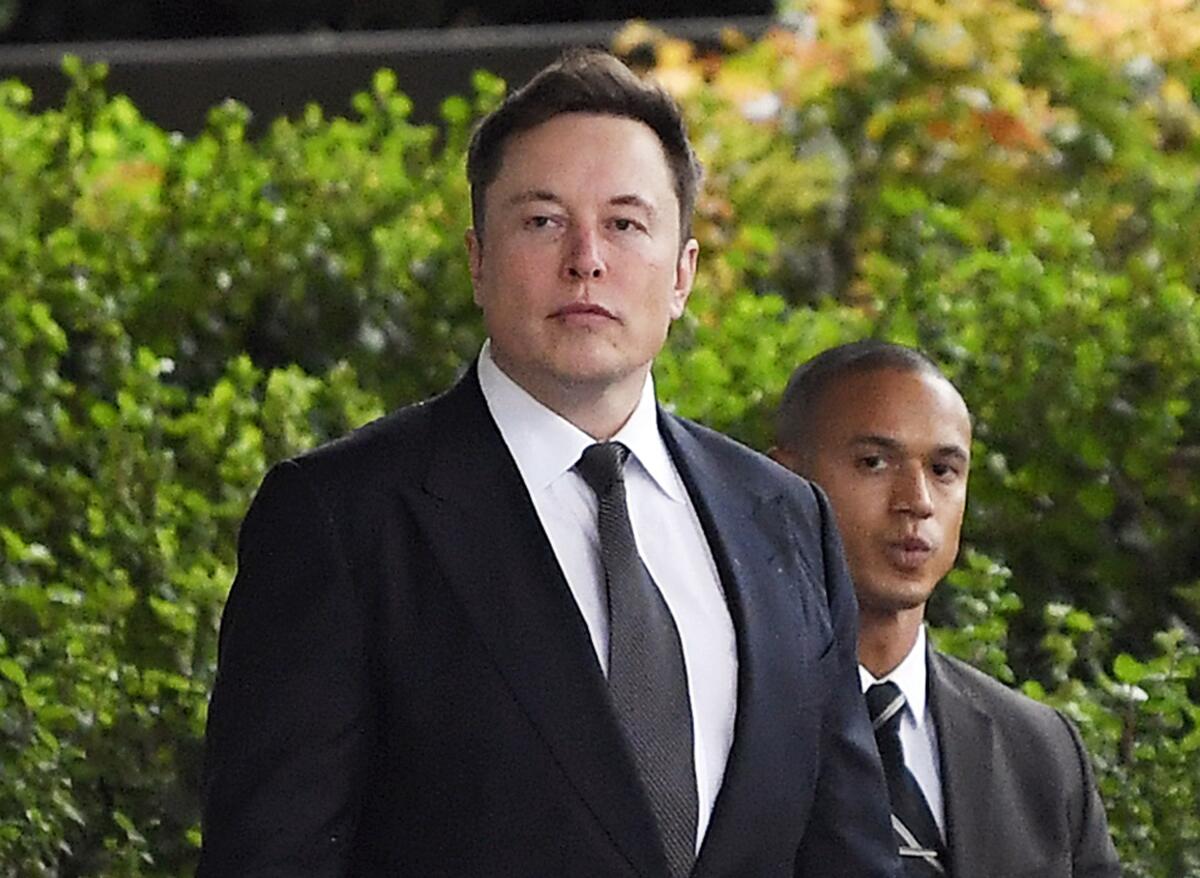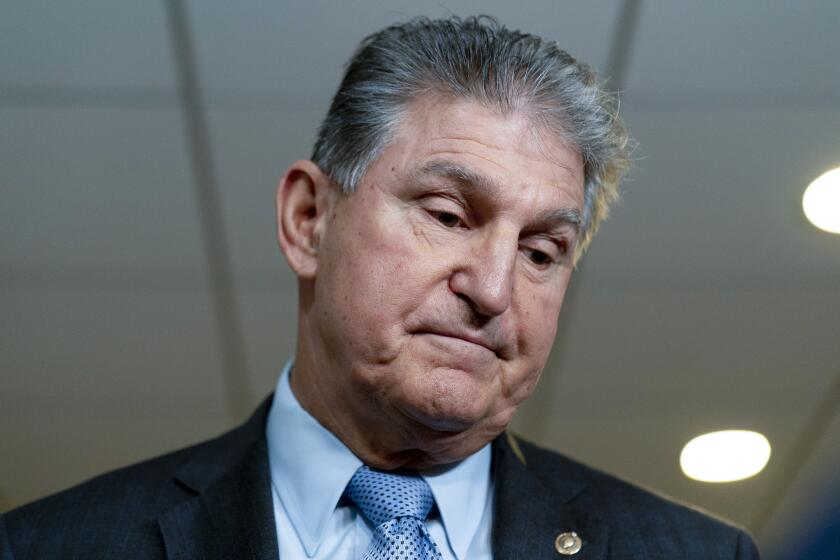Column: Sen. Manchin says oh no, we mustn’t target the super-rich with higher taxes. But why on Earth not?

There has always been a troubling gap between rich and poor in this country. But these days, it’s grown worse.
Billionaires with unimaginable, unspendable fortunes go full years without paying any federal income taxes at all. Meanwhile, ordinary workers’ wages have been stagnant for decades, and poor people are sleeping in miserable tent encampments on city streets.
For the record:
12:30 p.m. Nov. 15, 2021The citation for the finding that most Americans think there is too much income inequality in the U.S. should be the Pew Charitable Trusts, not the Pew Research Center.
Why are Americans not clamoring louder for fairness? Why are we so reluctant to take a reasonable share of Elon Musk’s and Jeff Bezos’ billions of dollars in taxes and put that money to work solving the country’s enormous social problems?
The way it’s always been explained to me is that we Americans don’t want to declare war on the rich. In fact, we identify with the ultra-wealthy, and admire them — and hope to become rich and pay no taxes ourselves.
Opinion Columnist
Nicholas Goldberg
Nicholas Goldberg served 11 years as editor of the editorial page and is a former editor of the Op-Ed page and Sunday Opinion section.
Horatio Alger’s rags-to-riches stories about Mark the Match Boy and Ben the Luggage Carrier may be 150 years old, but they’re deeply rooted in our collective unconscious. We’re still proselytized by ads and TV shows and get-rich-quick schemes that promise us wealth and luxury tomorrow if we play our cards right today.
But increasingly, Americans are realizing that this is a great national fantasy. The notion that with a little luck and pluck any citizen can become the next John D. Rockefeller, Warren Buffett or Bill Gates is a fairy tale.
Sure, there was a time when wages grew and the stock market climbed, and young people who went to college and found a decent job could generally feel confident about their rising expectations.
But these days are not those days. Social mobility is not America’s strong suit anymore. One Pew Research Center study from 2015 found that children born into different economic circumstances “can expect very distinct economic futures.”
Meanwhile, the extremes have grown more extreme. While homelessness has reached crisis proportions in cities including Los Angeles, San Francisco and New York, Musk can lose $50 billion when Tesla stock falls, as it did this week, and still be worth more than $200 billion.
Former Labor Secretary Robert Reich calculated that it would take the median U.S. worker over 4 million years to earn that much money.
Manchin thinks too many people are looking for handouts, while West Virginia is one of the states most reliant on federal money.
In California, more than one-third of the state’s nearly 40 million people live close to the poverty line. But Forbes counts 189 billionaires living in the state. Surely there comes a point where that discrepancy becomes obscene, where democracy itself is threatened by such drastic concentrations of power.
A survey released this week by the Public Policy Institute of California found that more than 6 in 10 respondents believe children in California will be worse off financially than their parents when they grow up. And 63% believe that the American dream — that if you work hard you’ll get ahead — either no longer holds true or never held true in the first place.
And yes, the richest people in America often pay a lower effective tax rate than the rest of us. And sometimes nothing at all: As a report from ProPublica shows, Bezos didn’t pay a dime in federal taxes in 2007 and 2011. George Soros, Michael Bloomberg, Musk and others have all had years where they didn’t either.
Emmanuel Saez and Gabriel Zucman, UC Berkeley economists, report that the super-rich — the top 0.01% of earners — paid approximately 70% of their income in taxes in 1950. By 2017 that was down to less than 25%.
That’s outrageous. And it’s the backdrop against which a “billionaire tax” was recently discussed in Washington.
During negotiations over the Biden administration’s social spending package, Sen. Ron Wyden (D-Ore.) specifically sought to tax the wealth, not just the income, of billionaires. His proposed levy on the “unrealized gains” of the very rich would have affected fewer than 1,000 of the nation’s top earners.
But Sen. Joe Manchin III (D-W.Va.) single-handedly shot the proposal down, saying government should not “target” people who have “contributed to society” and who “create a lot of jobs and invest a lot of money.”
That skirmish is over. But the idea won’t fade away. Most Americans say there is too much income inequality in the U.S. today, according to the Pew Research Center. (The gap is larger here, incidentally, than in any other G-7 nation.)
The pandemic hit this Black family hard, medically and financially. A white couple has adapted, and thrives.
Wyden’s approach may or may not be the right one. But it is common sense that the obscenely rich should pay a greater and fairer share. In our progressive tax system, that’s not targeting anyone for being rich, it’s just the way it works.
And I for one don’t believe closing loopholes or raising rates or taxing wealth will make America’s billionaires any less productive, or that they’ll flee the country or stop “creating jobs.”
Meanwhile, our thanks should go out to people like Morris Pearl, a former BlackRock executive, who argues that his own taxes, and the taxes of his fellow multimillionaires, should be higher. He recently told the New York Times: “I’m sitting here in a chaise longue in Hilton Head Island on the beach, and I pay a far lower tax rate than people that work for a living.”
Sen. Manchin said, as he snuffed out the billionaire tax, that it was time for Americans to “all pull together and row together.” If he wants to know how that can be done, maybe he should check in with Morris Pearl.
More to Read
A cure for the common opinion
Get thought-provoking perspectives with our weekly newsletter.
You may occasionally receive promotional content from the Los Angeles Times.













